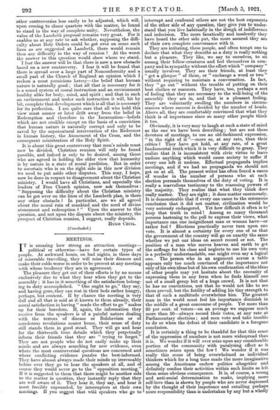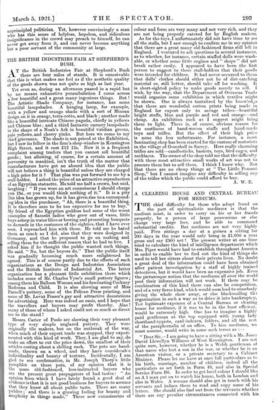MEETINGS.
IT is amazing how strong an attraction meetings— political political or otherwise—have for certain types of people. At awkward hours, on bad nights, in these days of miserable travelling, they will miss their dinners and make their colds worse in order to be present at any meeting with whose tendency they are in agreement.
The pleasure they get out of their efforts is by no means exclusively due to what they hear when they get to the assembly ; it has in it something of the satisfaction belong- ing to duty accomplished. " One ought to go," they say, and having gone, they can rest in their beds rather hungry, perhaps, but content. If by chance the meeting is very dull and all that is said at it known to them already, their moral satisfaction in having " made the effort to go " makes up for their boredom. If, again, the information they receive from the speakers is of a painful nature dealing with the terrors of disease or Bolshevism or of murderous revolutions nearer home, their sense of duty still stands them in good stead. They will go and hear for the thirteenth time details which they perpetually inform their friends that they are " trying to forget." They are not people who do not easily make up their minds and are always searching for new evidence, even where the most controversial questions are concerned and where conflicting evidence puzzles the best-informed. They have almost always made their minds up irrevocably before ever they go to hear the speakers at all, and of course they would never go to the " opposition meeting." If it is suggested to them that there might be another side to the matter in question, they instantly reply that they are well aware of it. They hear it, they say, and hear it most forcibly expounded, by interrupters at their own meetings. If you suggest that wild speakers who go to interrupt and confound others are not the best exponents of the other side of any question, they give you to under- stand that you live habitually in the slough of indifference and indecision. The more fanatically and insolently they have heard the other side put, the more assured they are of their own complete conversance with it.
They are irritating, these people, and often tempt one to declare that what they describe as a duty is really nothing but a pleasure. They like, we say to ourselves, to sit among their fellow-creatures and feel themselves in com- pany and in sympathy without the effort which " company " usually involves. They see their Mends, at least they " get a glimpse " of them, or " exchange a word or two " without requiring to maintain a conversation. In fact, they " go out " without the trouble of putting on their best clothes or manners. They have, too, perhaps a sorb of feeling that they are necessary to the well-being of the assembly they are in, and that is a pleasant feeling. They are voluntarily swelling the numbers in circum- stances where success is decided by the number of heads. Above all, they are comfortably convinced that what they think is of importance since so many other people think it too.
Obviously, it is very easy to laugh at such a state of mind as the one we have been describing ; but are not these devotees of meetings, to use an old-fashioned expression, " in the right of it "—more so, at any rate, than their critics They have got hold, at any rate, of a great fundamental truth which it is very difficult to grasp. They realize that it is inconsistent with civic virtue to leave undone anything which would cause society to suffer if every one left it undone. Effectual propaganda implies meetings, and if we had no propaganda we should not get on at all. The present writer has often found a cause of wonder in the number of persons who at each election persuade themselves of the duty of voting. It is really a marvellous testimony to the reasoning powers of the majority. They realize that what they think does really matter. They are right ; it does matter enormously. It is demonstrable that if every one came to the erroneous conclusion that it did not matter, civilization would be very seriously endangered. Yet how difficult it often is to keep that truth in mind l Among so many thousand persons hastening to the poll to express their views, what importance can one insignificant man or woman have—or rather feel ? Elections practically never turn upon one vote. It is almost a certainty for every one of us that the government of the country will go on exactly the same whether we put our ideas on secret record or not. The position of a man who moves heaven and earth to get the suffrage for his class and neglects to use his own vote is a perfectly understandable, one might even say a logical one. The person who in an argument across a table appears only too much convinced of the importance not only of his own ideas but of his own confirmation of the ideas of other people may yet hesitate about the necessity of expressing them in any form when he finds himself one not of a small group but of a huge crowd. It is not that he has no convictions, not that he would not like to see them prevail, but the futility of adding his tiny strength to that of such a multitude overwhelms him. The greatest man in the world must feel his importance diminish in the middle of a great concourse of people. Yet more than 50 per cent. of voters—on an average we suppose much more than 50—always record their votes, at any rate at Parliamentary elections ; and men vote and take trouble to do so when the defeat of their candidate is a foregone conclusion.
It is certainly a thing to be thankful for that this sense of the oppression of numbers is not more widespread than it is. We wonder if it will ever seize upon any considerable portion of the community with paralysing effect as it sometimes seizes upon the few ? We wonder if it was really this sense of being overwhelmed as individual thinkers which for a long time made the more imaginative among the Americans eschew politics altogether and definitely confine their activities within such limits as left them some obvious consequence. It is, of course, a wrong and anti-social determination to make, implying more self-love than is shown by people who are never depressed by the thought of their impotence and entailing perhaps more responsibility than is undertaken by any but a wholly unprincipled politician. Yet, however convincingly a man who has this sense of helpless, hopeless, and ridiculous insignificance in the crowd may preach to himself, he can never get away from it, and can never become anything but a poor servant of the community at large.



































 Previous page
Previous page